Sangwoo Park
Shitz
THINKSAFE: Self-Generated Safety Alignment for Reasoning Models
Jan 30, 2026Abstract:Large reasoning models (LRMs) achieve remarkable performance by leveraging reinforcement learning (RL) on reasoning tasks to generate long chain-of-thought (CoT) reasoning. However, this over-optimization often prioritizes compliance, making models vulnerable to harmful prompts. To mitigate this safety degradation, recent approaches rely on external teacher distillation, yet this introduces a distributional discrepancy that degrades native reasoning. We propose ThinkSafe, a self-generated alignment framework that restores safety alignment without external teachers. Our key insight is that while compliance suppresses safety mechanisms, models often retain latent knowledge to identify harm. ThinkSafe unlocks this via lightweight refusal steering, guiding the model to generate in-distribution safety reasoning traces. Fine-tuning on these self-generated responses effectively realigns the model while minimizing distribution shift. Experiments on DeepSeek-R1-Distill and Qwen3 show ThinkSafe significantly improves safety while preserving reasoning proficiency. Notably, it achieves superior safety and comparable reasoning to GRPO, with significantly reduced computational cost. Code, models, and datasets are available at https://github.com/seanie12/ThinkSafe.git.
Reliable LLM-Based Edge-Cloud-Expert Cascades for Telecom Knowledge Systems
Dec 23, 2025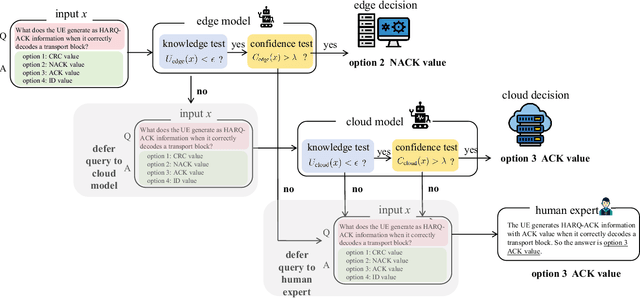
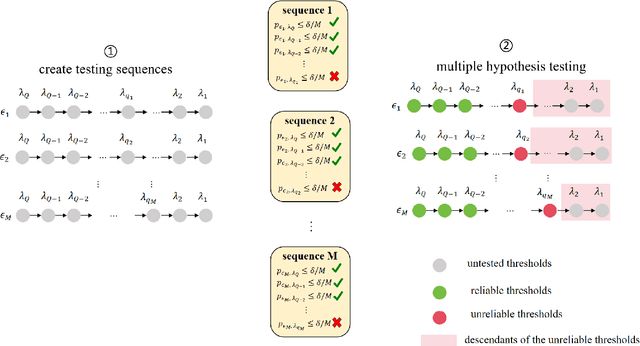
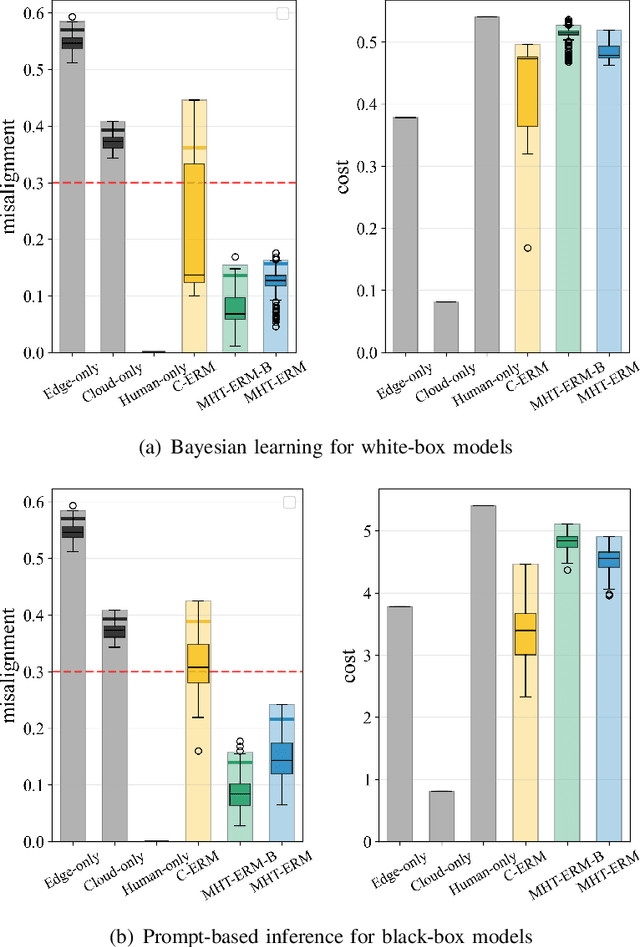
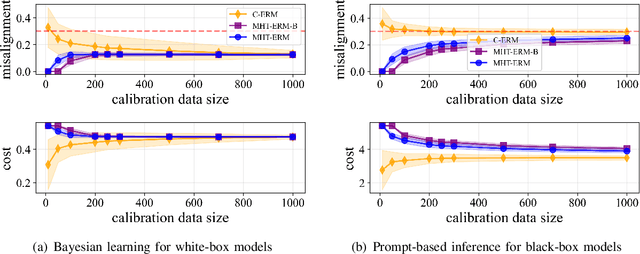
Abstract:Large language models (LLMs) are emerging as key enablers of automation in domains such as telecommunications, assisting with tasks including troubleshooting, standards interpretation, and network optimization. However, their deployment in practice must balance inference cost, latency, and reliability. In this work, we study an edge-cloud-expert cascaded LLM-based knowledge system that supports decision-making through a question-and-answer pipeline. In it, an efficient edge model handles routine queries, a more capable cloud model addresses complex cases, and human experts are involved only when necessary. We define a misalignment-cost constrained optimization problem, aiming to minimize average processing cost, while guaranteeing alignment of automated answers with expert judgments. We propose a statistically rigorous threshold selection method based on multiple hypothesis testing (MHT) for a query processing mechanism based on knowledge and confidence tests. The approach provides finite-sample guarantees on misalignment risk. Experiments on the TeleQnA dataset -- a telecom-specific benchmark -- demonstrate that the proposed method achieves superior cost-efficiency compared to conventional cascaded baselines, while ensuring reliability at prescribed confidence levels.
On-Device Fine-Tuning via Backprop-Free Zeroth-Order Optimization
Nov 14, 2025Abstract:On-device fine-tuning is a critical capability for edge AI systems, which must support adaptation to different agentic tasks under stringent memory constraints. Conventional backpropagation (BP)-based training requires storing layer activations and optimizer states, a demand that can be only partially alleviated through checkpointing. In edge deployments in which the model weights must reside entirely in device memory, this overhead severely limits the maximum model size that can be deployed. Memory-efficient zeroth-order optimization (MeZO) alleviates this bottleneck by estimating gradients using forward evaluations alone, eliminating the need for storing intermediate activations or optimizer states. This enables significantly larger models to fit within on-chip memory, albeit at the cost of potentially longer fine-tuning wall-clock time. This paper first provides a theoretical estimate of the relative model sizes that can be accommodated under BP and MeZO training. We then numerically validate the analysis, demonstrating that MeZO exhibits accuracy advantages under on-device memory constraints, provided sufficient wall-clock time is available for fine-tuning.
Rethinking Reward Models for Multi-Domain Test-Time Scaling
Oct 02, 2025Abstract:The reliability of large language models (LLMs) during test-time scaling is often assessed with \emph{external verifiers} or \emph{reward models} that distinguish correct reasoning from flawed logic. Prior work generally assumes that process reward models (PRMs), which score every intermediate reasoning step, outperform outcome reward models (ORMs) that assess only the final answer. This view is based mainly on evidence from narrow, math-adjacent domains. We present the first unified evaluation of four reward model variants, discriminative ORM and PRM (\DisORM, \DisPRM) and generative ORM and PRM (\GenORM, \GenPRM), across 14 diverse domains. Contrary to conventional wisdom, we find that (i) \DisORM performs on par with \DisPRM, (ii) \GenPRM is not competitive, and (iii) overall, \GenORM is the most robust, yielding significant and consistent gains across every tested domain. We attribute this to PRM-style stepwise scoring, which inherits label noise from LLM auto-labeling and has difficulty evaluating long reasoning trajectories, including those involving self-correcting reasoning. Our theoretical analysis shows that step-wise aggregation compounds errors as reasoning length grows, and our empirical observations confirm this effect. These findings challenge the prevailing assumption that fine-grained supervision is always better and support generative outcome verification for multi-domain deployment. We publicly release our code, datasets, and checkpoints at \href{https://github.com/db-Lee/Multi-RM}{\underline{\small\texttt{https://github.com/db-Lee/Multi-RM}}} to facilitate future research in multi-domain settings.
Data-Efficient Prediction-Powered Calibration via Cross-Validation
Jul 27, 2025Abstract:Calibration data are necessary to formally quantify the uncertainty of the decisions produced by an existing artificial intelligence (AI) model. To overcome the common issue of scarce calibration data, a promising approach is to employ synthetic labels produced by a (generally different) predictive model. However, fine-tuning the label-generating predictor on the inference task of interest, as well as estimating the residual bias of the synthetic labels, demand additional data, potentially exacerbating the calibration data scarcity problem. This paper introduces a novel approach that efficiently utilizes limited calibration data to simultaneously fine-tune a predictor and estimate the bias of the synthetic labels. The proposed method yields prediction sets with rigorous coverage guarantees for AI-generated decisions. Experimental results on an indoor localization problem validate the effectiveness and performance gains of our solution.
Adaptive Prediction-Powered AutoEval with Reliability and Efficiency Guarantees
May 24, 2025Abstract:Selecting artificial intelligence (AI) models, such as large language models (LLMs), from multiple candidates requires accurate performance estimation. This is ideally achieved through empirical evaluations involving abundant real-world data. However, such evaluations are costly and impractical at scale. To address this challenge, autoevaluation methods leverage synthetic data produced by automated evaluators, such as LLMs-as-judges, reducing variance but potentially introducing bias. Recent approaches have employed semi-supervised prediction-powered inference (\texttt{PPI}) to correct for the bias of autoevaluators. However, the use of autoevaluators may lead in practice to a degradation in sample efficiency compared to conventional methods using only real-world data. In this paper, we propose \texttt{R-AutoEval+}, a novel framework that provides finite-sample reliability guarantees on the model evaluation, while also ensuring an enhanced (or at least no worse) sample efficiency compared to conventional methods. The key innovation of \texttt{R-AutoEval+} is an adaptive construction of the model evaluation variable, which dynamically tunes its reliance on synthetic data, reverting to conventional methods when the autoevaluator is insufficiently accurate. Experiments on the use of LLMs-as-judges for the optimization of quantization settings for the weights of an LLM, and for prompt design in LLMs confirm the reliability and efficiency of \texttt{R-AutoEval+}.
FedSVD: Adaptive Orthogonalization for Private Federated Learning with LoRA
May 19, 2025Abstract:Low-Rank Adaptation (LoRA), which introduces a product of two trainable low-rank matrices into frozen pre-trained weights, is widely used for efficient fine-tuning of language models in federated learning (FL). However, when combined with differentially private stochastic gradient descent (DP-SGD), LoRA faces substantial noise amplification: DP-SGD perturbs per-sample gradients, and the matrix multiplication of the LoRA update ($BA$) intensifies this effect. Freezing one matrix (e.g., $A$) reduces the noise but restricts model expressiveness, often resulting in suboptimal adaptation. To address this, we propose FedSVD, a simple yet effective method that introduces a global reparameterization based on singular value decomposition (SVD). In our approach, each client optimizes only the $B$ matrix and transmits it to the server. The server aggregates the $B$ matrices, computes the product $BA$ using the previous $A$, and refactorizes the result via SVD. This yields a new adaptive $A$ composed of the orthonormal right singular vectors of $BA$, and an updated $B$ containing the remaining SVD components. This reparameterization avoids quadratic noise amplification, while allowing $A$ to better capture the principal directions of the aggregate updates. Moreover, the orthonormal structure of $A$ bounds the gradient norms of $B$ and preserves more signal under DP-SGD, as confirmed by our theoretical analysis. As a result, FedSVD consistently improves stability and performance across a variety of privacy settings and benchmarks, outperforming relevant baselines under both private and non-private regimes.
Conformal Calibration: Ensuring the Reliability of Black-Box AI in Wireless Systems
Apr 16, 2025Abstract:AI is poised to revolutionize telecommunication networks by boosting efficiency, automation, and decision-making. However, the black-box nature of most AI models introduces substantial risk, possibly deterring adoption by network operators. These risks are not addressed by the current prevailing deployment strategy, which typically follows a best-effort train-and-deploy paradigm. This paper reviews conformal calibration, a general framework that moves beyond the state of the art by adopting computationally lightweight, advanced statistical tools that offer formal reliability guarantees without requiring further training or fine-tuning. Conformal calibration encompasses pre-deployment calibration via uncertainty quantification or hyperparameter selection; online monitoring to detect and mitigate failures in real time; and counterfactual post-deployment performance analysis to address "what if" diagnostic questions after deployment. By weaving conformal calibration into the AI model lifecycle, network operators can establish confidence in black-box AI models as a dependable enabling technology for wireless systems.
Online Conformal Probabilistic Numerics via Adaptive Edge-Cloud Offloading
Mar 18, 2025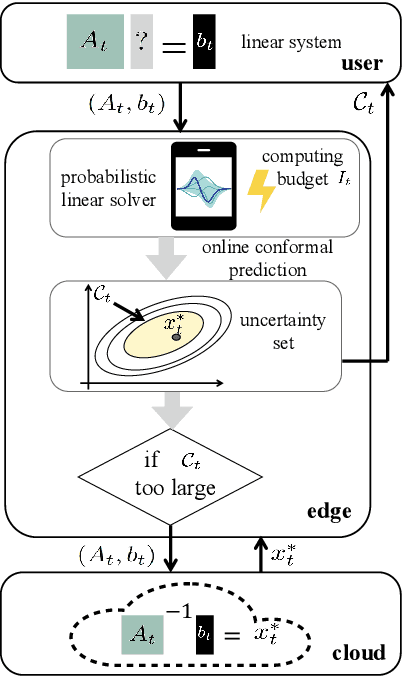
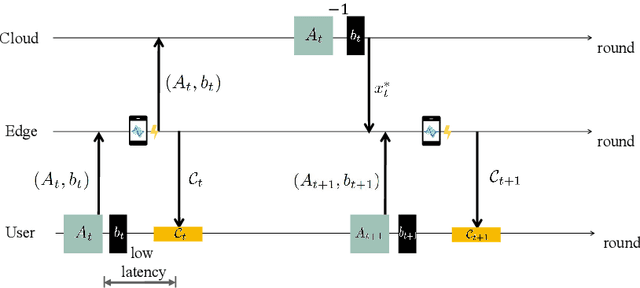


Abstract:Consider an edge computing setting in which a user submits queries for the solution of a linear system to an edge processor, which is subject to time-varying computing availability. The edge processor applies a probabilistic linear solver (PLS) so as to be able to respond to the user's query within the allotted time and computing budget. Feedback to the user is in the form of an uncertainty set. Due to model misspecification, the uncertainty set obtained via a direct application of PLS does not come with coverage guarantees with respect to the true solution of the linear system. This work introduces a new method to calibrate the uncertainty sets produced by PLS with the aim of guaranteeing long-term coverage requirements. The proposed method, referred to as online conformal prediction-PLS (OCP-PLS), assumes sporadic feedback from cloud to edge. This enables the online calibration of uncertainty thresholds via online conformal prediction (OCP), an online optimization method previously studied in the context of prediction models. The validity of OCP-PLS is verified via experiments that bring insights into trade-offs between coverage, prediction set size, and cloud usage.
Convergence Analysis of alpha-SVRG under Strong Convexity
Mar 16, 2025Abstract:Stochastic first-order methods for empirical risk minimization employ gradient approximations based on sampled data in lieu of exact gradients. Such constructions introduce noise into the learning dynamics, which can be corrected through variance-reduction techniques. There is increasing evidence in the literature that in many modern learning applications noise can have a beneficial effect on optimization and generalization. To this end, the recently proposed variance-reduction technique, alpha-SVRG [Yin et al., 2023] allows for fine-grained control of the level of residual noise in the learning dynamics, and has been reported to empirically outperform both SGD and SVRG in modern deep learning scenarios. By focusing on strongly convex environments, we first provide a unified convergence rate expression for alpha-SVRG under fixed learning rate, which reduces to that of either SGD or SVRG by setting alpha=0 or alpha=1, respectively. We show that alpha-SVRG has faster convergence rate compared to SGD and SVRG under suitable choice of alpha. Simulation results on linear regression validate our theory.
 Add to Chrome
Add to Chrome Add to Firefox
Add to Firefox Add to Edge
Add to Edge